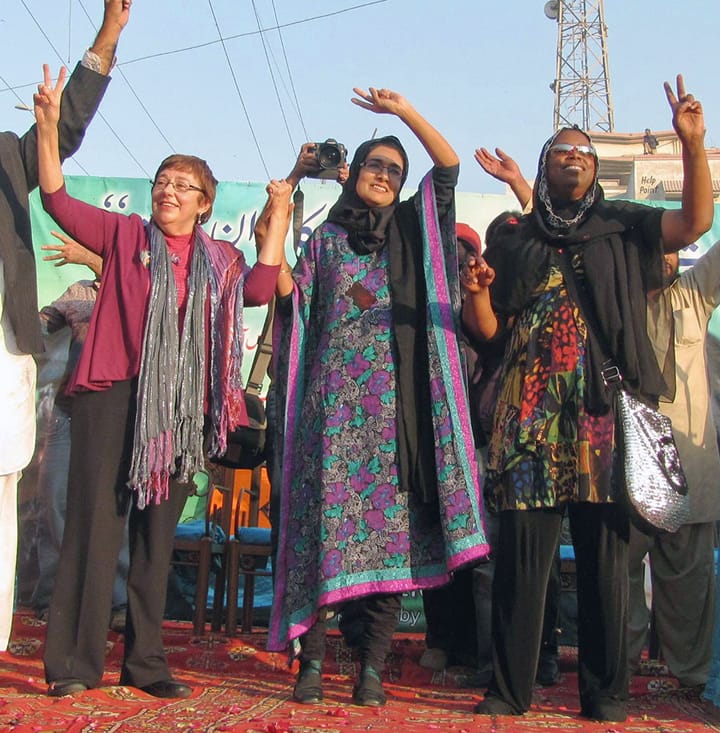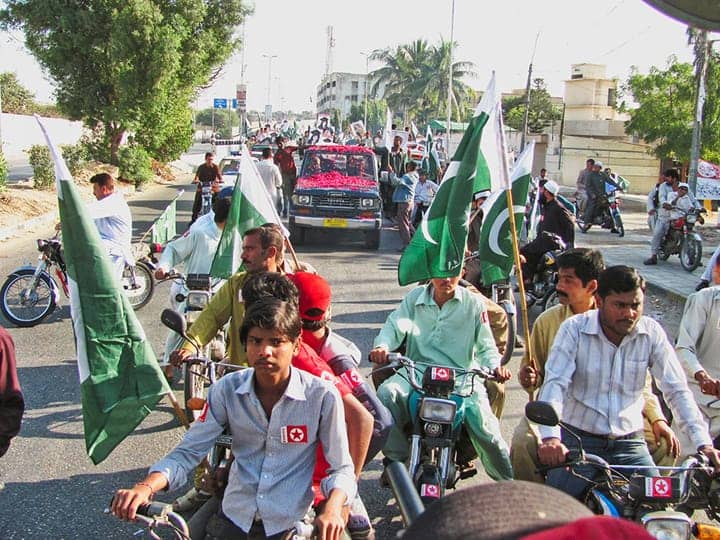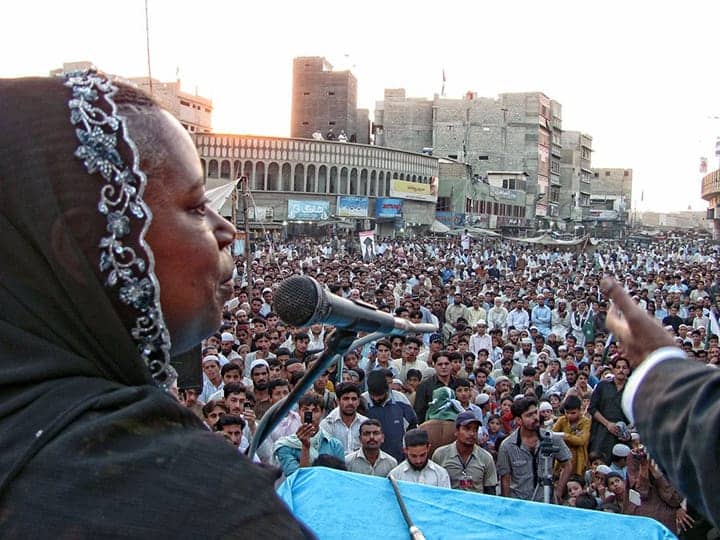Arriving in Karachi, Pakistan, at 4 a.m. for a trip in support of efforts to free and repatriate Dr. Aafia Siddiqui, former U.S. Congressperson Cynthia McKinney and International Action Center Co-Director Sara Flounders received an overwhelmingly warm welcome on Dec. 2. Hundreds of Siddiqui’s supporters met the two at the airport in the wee hours of the morning, carrying flowers, signs and banners, and chanting “Free Aafia!” and “Welcome!”

The greeting of hundreds, as well as the weeklong trip, was organized by Dr. Fowzia Siddiqui, Aafia Siddiqui’s sister, and the Free Aafia Movement.
Later that day, McKinney, Flounders and Fowzia Siddiqui participated in a “Caravan of Dignity” through the streets of Karachi, with cars, hundreds of motorbikes sporting “Free Aafia” signs and Pakistani flags, and an open-bed truck blasting songs in honor of Siddiqui. Thousands of people on foot surrounded the caravan, which proceeded to a huge outdoor rally where all three spoke in support of Siddiqui’s return to Pakistan. They were showered in rose petals along the route.
In a Dec. 2 email, Flounders writes: “Karachi is twice the size of New York City. This is Aafia’s hometown. Here the demand for her repatriation to Pakistan and her release from the torture of solitary confinement in U.S. federal prison has overwhelming support. Aafia is a heartfelt symbol of all the missing and disappeared, the victims of U.S. secret rendition programs and targeted drone assassinations.”
Flounders relates that in Karachi, this sentiment was displayed by “countless spray-painted walls and overpasses in English and Urdu with ‘Free Aafia,’ ‘Free our sister’ and the best one, ‘86 years – bullshit,’ painted everywhere.” Siddiqui was sentenced to 86 years in prison by a U.S. federal judge in 2010.
After the rally, McKinney and Flounders traveled to the home of Siddiqui’s mother, Ismat Siddiqui, passing giant canvas pictures of previous rallies for Aafia Siddiqui on the streets leading to the home. Political leaders dropped by the home to speak with the U.S. visitors. Ismat Siddiqui, who sobbed for the return of her daughter, lives with Dr. Fowzia Siddiqui and her two children, as well as the two children of Aafia Siddiqui who were returned after being abducted with their mother.
The next day, McKinney and Flounders continued holding meetings and rallies to free Aafia Siddiqui. At a meeting with some 200 lawyers of Pakistan’s High Court Bar, the lawyers pledged to take legal action to force the government to act on Siddiqui’s behalf. McKinney and Flounders also met with a former chief Supreme Court judge and all of the members of the Karachi Press Club. After a university meeting on U.S. extrajudicial assassinations and secret renditions was hastily canceled, the two women held a huge street meeting with more than 1,000 students outside the school.

The movement for Aafia Siddiqui is now focused on getting every part of the political movement – and all the different political officials – to publicly pledge that no one held in Pakistani custody will be released to the U.S. until she is returned. Supporters are urged to sign a petition issued by the International Action Center at iacenter.org.
Flounders and McKinney also traveled to Islamabad, the capital of Pakistan, as well as the city of Lahore and Khyber province. In addition to Workers World coverage of Siddiqui’s case and Flounders and McKinney’s trip (workers.org), more information can be found at freeaafia.org and aafiamovement.com.
© 2012 Workers World. This story was originally published by Workers World, 55 W. 17th St., New York NY 10011, wwp@workers.org, www.workers.org, which permits verbatim copying and distribution in any medium without royalty provided this notice is preserved. LeiLani Dowell can be reached at LeiLani.Dowell@workers.org.
Cynthia McKinney held briefly on return from Pakistan
On Dec. 12, former six-term Congresswoman Cynthia McKinney was detained briefly at Atlanta airport while entering the United States on her return from a visit to Pakistan, where she campaigned for the release of Dr. Aafia Siddiqui, who is serving an 86-year sentence for her alleged attempt to kill U.S. soldiers in Afghanistan.
When she was asked by a woman official she visited in Pakistan, “I told her Dr. Aafia Siddiqui’s family. She asked me who else and I responded ambassadors, diplomats, academicians, because lots of Pakistanis studied in the U.S.”
In a piece titled “The Soft Repression Continues,” published on Dec. 13 by Op Ed News, McKinney provided a graphic account of her encounter with the officials:
“I asked them … why I was getting this individualized attention. They responded that they were just following orders. … One respectfully said that Pakistan was a country of interest due to training camps. I responded, ‘You mean the U.S. training camps?’ He smiled knowingly.”

During her Dec. 2-9 visit to Pakistan, McKinney was accompanied by International Action Center Co-Director Sara Flounders. The greeting by hundreds, as well as the weeklong trip, was organized by Dr. Fowzia Siddiqui, Aafia Siddiqui’s sister, and the Free Aafia Movement.
While in Karachi, McKinney and Flounders met with Justice Saeeduzzaman Siddiqui, the former chief justice of Pakistan who said that the policy of the incumbent government was to make Aafia’s case a pending issue so the caretaker government can then complete the task. However, he added, caretaker governments usually do not pick up new issues.
Addressing a press conference in the Islamabad Press Club, Cynthia McKinney said: “I am here for Dr. Aafia Siddiqui. When I first learned of her situation, I decided to do all that I could do to reverse the injustice to this poor innocent woman. The United States has more to give Pakistan than drones, bombs and missiles. The United States can give Aafia back. The Pakistan leadership just has to ask.”
She went on to say that “returning Dr. Aafia to Pakistan is the will of the people. People power can become very rebellious when it comes to dignity and honor of their daughters. I sensed the emotion within the masses.”
Lashing out at the War on Terror policy of the U.S., McKinney said that American policies regarding war are not good; innocent people, including children, women and other fall prey to U.S. bombings. In the war, she further said, dangerous weapons, including depleted uranium, were being used. “I paid visits to Libya, Gaza and other countries to apologize from the people of those states against the U.S. wrong policies regarding war and now came to Pakistan to seek apology in this regard.”
Sara Flounders, an American political writer and member of the Secretariat of Workers World Party, as well as a principal leader of the International Action Center, while addressing the press conference, said Dr. Aafia’s case is a political case. Flounders had attended the trial and sentencing.
“Dr. Aafia was tortured, the (sentence of ) 86 years was shameful – and, we realize, a political sentence – and her rendition illegal,” Flounders said. “The solution is political and diplomatic. It does not lie in the courts even though they are needed to keep channels open. We believe the political solution is simple and glaringly obvious; however, this requires concrete action from the Pakistani government.” She further emphasized that by releasing Aafia, U.S. and Pakistani leaders can reverse a step in recovering the damaged sovereignty.
Addressing a press conference in the Islamabad Press Club, Cynthia McKinney said: “I am here for Dr. Aafia Siddiqui. When I first learned of her situation, I decided to do all that I could do to reverse the injustice to this poor innocent woman. The United States has more to give Pakistan than drones, bombs and missiles. The United States can give Aafia back. The Pakistan leadership just has to ask.”
Both human rights activists said that Dr. Aafia Siddiqui could be returned to her native land Pakistan very easily through just an official letter, but it depends on the Pakistani government. “Pakistan’s government is not serious to bring back Aafia from America by writing a letter,” they lamented. They appealed to the rulers of Pakistan to take the matter seriously and try their best for release of Aafia, saying, “She is the daughter of all Pakistanis.”
McKinney and Flounders also visited press conferences and rallies in Peshawar, Lahore and Hyderabad in support of the release of Dr. Aafia Siddiqui.
The Pakistan American Democratic Forum, PADF, is the main initiator of the American human rights activists’ visit to Pakistan. In a message on this occasion, Dr. Agha Saeed, founding president of the PADF, said:
“Today, both Pakistan, the country of my origin, and the U.S., my adopted homeland, are in deep turmoil. Yet there is one major, substantial, significant and consequential difference between the two. To paraphrase Professor Ali Mazrui, one of the most profound thinkers of this age, while Pakistan is a ‘pre-democratic’ country that is slowly transforming itself into fledgling democracy, the U.S. is fast becoming a ‘post-democratic’ country, a country that is beginning to shed the foundational features of democracy, namely, habeas corpus, due process and equal justice.
“Today, while our most highly respected sister, Dr. Aafia, is the most prominent ‘prisoner of war,’ Dr. Sami Al-Arian is the most distinguished ‘political prisoner’ in the United States. The basic crisis of civil rights today is not airport profiling but the denial of due process and of equality before the law.”
Today, we are participant-observers to the emergence of a truly “consequential” coalition between Muslim Americans and a wide array of fellow Americans, such as Congressperson Cynthia McKinney and Ms. Sara Flounders, Dr. Agha Saeed concluded.
Abdus-Sattar Ghazali, a freelance journalist and author of “Islamic Pakistan: Illusions & Reality,” “Islam in the Post-Cold War Era,” “Islam & Modernism” and “Islam & Muslims in the Post-9/11 America,” is executive editor of American Muslim Perspective. This story first appeared on OpEd News.





